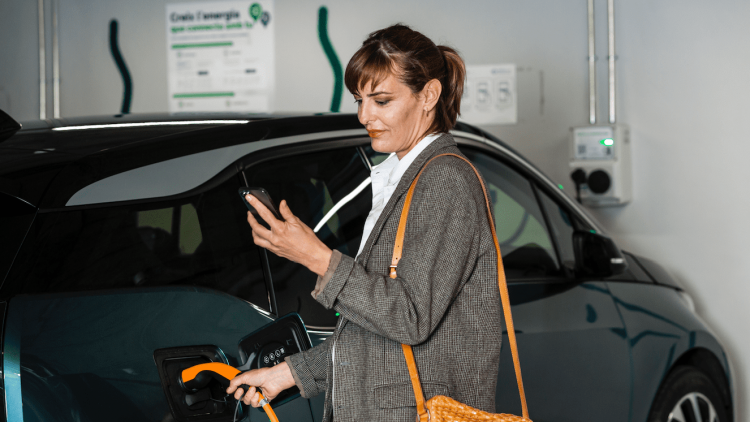Publication of invitation to tender
Would you know how make e-vehicle recharging points more flexible?
Finalist businesses
Award of contract to successful tenderer
Successful tenderer signs the contract
THE CHALLENGE
With the aim of becoming a more sustainable city, Barcelona is promoting the transformation to e-mobility. Electric vehicles (EV) will soon be ubiquitous, leading to higher demand for recharging points in public car parks. It is therefore necessary to manage the location of new recharging points in a flexible way, in order to adapt to demand ensure a high-quality service for city residents.
The challenge is to achieve flexible recharging points, i.e. recharging points that can be used in various spaces within a car park, and so are not limited to being in a fixed position.
A solution providing more flexible charging points would have many benefits for both BSM and the company that ultimately takes on this challenge.
The challenge is part of the effort to achieve the United Nations 2030 Agenda’s Sustainable Development Goals (SDGs). The innovation challenges in this tender process are intended to make a positive contribution to the following SDGs:
- 3. Health and well-being
- 7. Affordable clean energy
- 9. Industry, innovation and infrastructure
- 11. Sustainable cities and communities
- 12. Responsible consumption and production
MEET THE WINNER

The first project, headed by the Californian start-up EV Safe Charge, consists of implementing a mobile recharging point for electric vehicles. The unit can be moved to provide cover for various parking spaces, without being installed in a specific location. The mobile point must also be able to communicate with the central management system for the Endolla Barcelona network and interact with users of the Smou app. This challenge has a budget of around 90,000 euros for developing the prototype.
-
There are going to be 250,000 electric vehicles in Spain by 2024, according to the Spanish Ministry for Ecological Transition, with some 11,000 EVs expected in Barcelona, not counting motorcycles and mopeds. Barcelona City Council's short-term forecasts suggest that 80% of the municipal fleet, 8% of public transport and 8% of taxis (an estimated 800) will be electric vehicles by 2024. The impetus for all this come from the MOVES III calls for grant applications funded by the Next Generation European Funds, the low emissions zone and the social and tax benefits being promoted at both State and municipal levels.
In February 2022, the mobile fleet of electric cars / vans and plug-in hybrid cars stood at over 3,300 and 2,000 respectively in the city of Barcelona and at over 12,100 and 9,300 respectively throughout the province of Barcelona. In addition, there are also 14,000 mopeds and motorcycles and mopeds in the city. The current percentage of plug-in EVs in the municipality of Barcelona stands at 2.2% of all the vehicles in the city and continues to grow.
The network of municipal public car parks managed by BSM is essential in a city where most of its residents do no have places for installing charging points for their vehicles’ planned charging. What is more, the city is in the process of transforming its urban-mobility model, giving priority on public highways to pedestrians and shared mobility and, for the purposes of freeing up space, private-vehicle street parking zones area being steadily moved to urban underground areas.
The Endolla network currently has 667 public charging points (346 for cars, 321 for motorbikes). Most are located in underground car parks and enable slow, planned charging, more in accordance with the sustainability and efficiency goals of the network as a whole and towards where the urban infrastructure will be expanding over the coming years. Endolla also has fast-charging points on streets (currently 44), which provide the network with security and robustness, enabling occasional and brief charging when so required by users.
-
The purpose of the contract is to implement an innovative pilot solution
(involving developing, testing and implementing) that meets the challenge of providing flexible charging points for underground car parks managed by BSM.A flexible charging point is one that can provide a charging service without being tied to a fixed parking space. It must be able to cover a maximum distance of 50 metres for a continuous row of parking spaces and a minimum distance equivalent to 6 car parking spaces (about 15 metres).
The proposed solution must fulfil the requirements set out above and be able to charge at any given time at least one vehicle in such a row of car parking spaces covered by the flexible charging point.
The flexible charging system must be able to at least:
- Allow a charging rate of 7.2kW in single phase with the possibility of limiting the power based on the applicable legislation in force.
- Have a Mennekes (type 2) connector
- Have a strong solution to protect it against vandalism.
- The charging point solution that is eventually proposed must not interfere with the space provided for parking vehicles.
- Be compatible with BSM's charging point management system.
- Be compatible with the SMOU software (the personal mobility application for Barcelona whose features include, among others, the ability to charge an electric vehicle in Barcelona’s public car park network).
- Ensure that, if an installation is required, it is simple to carry out and all wiring or other necessary components end up properly integrated and do not affect the parking manoeuvre.
- Ensure that its maintenance is simple, with a warranty for at least 5 years of optimal operation and maintenance.
- Be viable from both financial and technical points of view.
- Comply with the current electric vehicle charging legislation applicable to both the charging points themselves and the car parks managed by BSM.
Meeting the following requirements will be seen as a positive factor in charging solutions:
- Simplifying and making intuitive the task of changing the vehicles to be charged, a task that will be carried out by individuals
- Being easily scalable to the other parking spaces of the city’s public car parks, as well as to other cities.
- Being designed to be easy to use for users with reduced mobility.
-
The challenge is to create a low-cost charging point for each parking space that is easy to install, cheap to operate and maintain, and can be operated using a customer application that communicates with a back-office system.
A more economical charging point solution would have many benefits for both BSM and the company that ultimately takes on this challenge.
For BSM, it entails:
- Being able to deploy recharging points without the need to place them in a fixed position, thereby covering various parking places.
- Having a solution that is better adapted to the demand for recharging e-vehicles in turnover parking spaces, in order to offer city residents a more flexible, efficient service.
- Reducing the cost associated with the facility, making more efficient use of the electrical infrastructure and avoiding oversizing.
- Helping to encourage city residents to choose electric mobility for their personal mobility.
- Having a real experience of a flexible recharging point in car parks. As a result of this experience, determining the technical and economic viability of the product.
- Having an economic deployment, operation and maintenance model that is viable both for BSM, and for users of the recharging service.
For the successful bidder, it entails:
- Having a technical solution that has been validated and tested in the real world in the car parks managed by BSM.
- Having a benchmark experience in the field of affordable e-vehicle recharging points in car park environments.
- Obtaining greater visibility and better market positioning, by having a tested innovative solution that can be implemented in car parks in a leading city for the sector, such as Barcelona.
- Having a solution that could be submitted to other possible BSM tenders.
- Having a solution that meets a global challenge that is of interest to both public administrations and private companies, at both national and international level.
-
BSM – Car parks
The BSM municipal car park network, which has over 40 public car parks and 15,000 parking spaces all over the city, has become established as an affordable and effective solution, making parking available to the city’s residents and service users. This network provides a wide range of parking solutions and products, as well as high-quality management (ISO 9001 certified).
Endolla BSM
Endolla manages the public e-vehicle recharging infrastructure in Barcelona city. In order to make the charging network robust and ensure it provides coverage, Endolla has charging points for electric motorbikes with Schuko connectors and fast charging points for electric vans and cars using CHAdeMO, CCS and Mennekes connectors on city streets, as well as slow charging points for electric cars and motorbikes using Schuko and Mennekes connectors in BSM underground car parks.
In order to use the recharging service, users interact with charging points and pay through the SMOU application, which provides many urban mobility services in the City of Barcelona.

